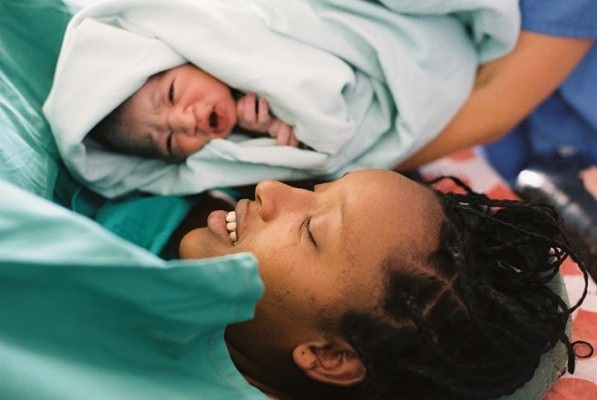January 30th
I mentioned previously that the diet here can be poor and it takes effort to ensure you eat properly. The local people vary in body shape due to different tribal origins but the one thing that they have in common is that they are all extremely lean. The average weight of women in the antenatal clinic is 50kg (and they are often at quite an advanced stage of pregnancy). It does make the management of problems easier (you can feel which way round a baby is and scan with a much higher accuracy with no body fat) and certainly the anaesthetics are easier because all the women are so slim. In the UK we use an aid called a "Pat-slide" to move women off the operating table but thus far nothing has been needed to help move a patient (with the one exception where it was all hands on deck).
One effect of the diet is that iodine deficiency is very common and so goitres (a swelling in the neck due to an enlarged thyroid) are almost universal. Likewise although I have not seen it yet spinal bifida in newborn babies is more common due to lack of folate (there are no folate supplements recommended routinely here).
The poor diet is mainly a result of a lack of money to buy food but also the fact that the traditional diet is very low in fruit and vegetables (with calories/protein coming from a grain called Tef made into a rubbery unleven bread called injura, served with oily stews of meat or pulses). In fact the market has a good range of fresh produce depending on the season. Currently red onions, tomatoes, avocados, (with the largest stones you have ever seen but as they are only 1burr (5p) for 3, you are getting what you paid for) potatoes, carrots, bananas (2-types), oranges, limes (that they call lemons) and fantastic large papayas are plentiful and I am told these "staples" are available all year round. With quality and price varying according to how abundant they are. There are two green vegetables that you can get hold of the are both called "rafu" one is recognisable as a sort of white cabbage and the other is a bit like spring greens (but very bitter). You can also find pumpkin (sold in slices) and beetroot (unfortunately they discard to beet tops). I managed to get some green beans this week but these are seasonal and considered very expensive at 10burr (50p)/kg. The other problem for the local diet is that any fruit and vegetables they do eat are cooked for a long time, a habit I assume that developed to avoid food poisoning but unfortunately destroying important vitamins.
I have seen no evidence of meat in town but am told if you want it you can find it but that it is very tough by western standards. Ethiopians are meat eaters if and when they can afford it (they even eat raw beef with a resultant tape-worm problem). I made the decision to eat vegetarian in Gimbi (as I think it is easier to avoid stomach upsets) but I will be looking forward to a steak when I get to Addis in a couple of weeks.
My diet here is pretty healthy as unlike Ethiopians I am going out of my way to get a good variety of vegetables. One of the gardeners in the compound grows lettuce so it is even possible to have a carefully washed salad (lettuce, white cabbage, tomatoes, beetroot and avocado). I have also managed to find a number of different ways to cook all of the available vegetables, this is helped as chillies, and garlic and fresh ginger are also widely sold in the market. I have learned to like to lentils, which is fortunate as these are my main source of protein although there are also excellent (if very small) eggs available for baking and omelettes. I have a cook (Tadilho) who sadly doesn't seem to want to make Ethiopian food even occasionally however much I ask but I have persuaded her that chilli is fine and so her lentil stew (with extra added vegetables) is not quite a gourmet meal but something I can look forward to. She makes good (slightly sweet) bread and excellent carrot cake so this is preventing me from loosing a lot of weight. There is also no dairy available, which is a bit of a mystery since there are goats and cows galore roaming the streets of the town. If you want milk it comes in the form of dried "Nido" (the wonderful Nestle monopoly on the African market means that a small tin that makes 10lites of milk is 140burr-£7, which is a fortune here in real terms). So I use it sparingly in porridge and I also treated myself to homemade rice pudding one night (which was really good). You may wonder about the term "sparingly" as I know that I can afford dried milk but it is amazing that surrounded by so much need you become acutely aware of what you spend on food and you also become obsessed with ensuring that absolutely nothing gets wasted, planning meals to reuse left-over's and to eat anything that might be nearing the end of it usable life.
Finally, no alcohol for three weeks, which as many of you know a record for me as I suspect that the last time I abstained for this length of time, was before I went to college i.e. when I was eighteen. There is beer available in town but the establishments are not very conducive to a quiet beer and as the majority of the other "faringe" are Seventh Day Adventists (who don't drink, smoke, eat meat or have caffeine if they are doing it properly- although they are not evangelical and intolerant of all of these behaviours in others) there is no one to go with me. The good news is that my alcoholic fast ended yesterday as Tekle (the local Obstetrician) brought me a bottle of Italian wine when he returned from Addis. It is much better than expected but then after three weeks I'm not sure I can be relied upon for my wine criticism as I may have a temporary bias. I am planning to make the bottle last as I don't drink when on-call (alternate nights now) and I think that 1-2glasses is all I really need to wash down spicy lentil stew!


No comments:
Post a Comment